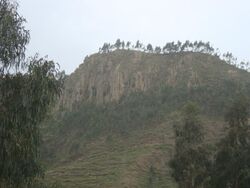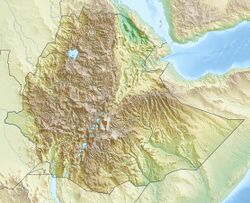Earth:Phonolite series in North Ethiopia
| Phonolite Series Stratigraphic range: Middle Miocene | |
|---|---|
 Plug at Addi Amyuq in Dogu’a Tembien | |
| Type | Geological formation |
| Overlies | Tertiary Basalts |
| Lithology | |
| Primary | Phonolite |
| Location | |
| Coordinates | [ ⚑ ] : 14°09′29″N 38°56′42″E / 14.158°N 38.945°E |
| Paleocoordinates | [ ⚑ ] 0°N 0°E / 0°N 0°E |
| Region | Tigray |
| Country | |
| Extent | Aksum-Adwa-Dogu’a Tembien |
The phonolite or clinkstone of northern Ethiopia is a shallow-seated igneous rock. The phonolites intruded and punctured the Mesozoic sedimentary rocks and the Tertiary flood basalts some 19 to 11 million years ago.[1][2]
Stratigraphic context
The formation occurs as plugs that have punctured the Tertiary flood basalts of the Ethiopian plateau, and form the highest peaks in their surrounding.[1]
Lithology
These phonolites are composed of alkali pyroxenes and nephelines; there are also elongated plagioclase crystals. Pyroxenes have a skeletal texture, whereas nepheline crystals are hexagonal to rectangular.[1][3] The phonolites of pink to light grey colour. The outcrops hold massive (up to 25 metres long), moderately weathered blocks, generally of elongated shape; in some locations it also forms spherical outcrops.[1]
Geographical extent
These silica-poor rocks belong to the Adwa-Aksum trachy-phonolite volcanic field.[4] They are also exposed in Addi Amyuq, some 3 kilometres north of Hagere Selam, on the northern slope of the ridge. The morphology of the Addi Amyuq phonolite outcrop is similar to that of Gobo Dura where the Aksum obelisks were quarried.[1]
Obelisks and church bells
The phonolites are among the best exploited rocks of northern Ethiopia. Notably, they were used to carve the monolithic obelisks and other monumental stones during the Aksumite kingdom. In Tembien they are used as church bells (in line with the name clinkstone) and dimension stones.[1]
References
- ↑ 1.0 1.1 1.2 1.3 1.4 1.5 Miruts Hagos and colleagues (2019). The volcanic rock cover of the Dogu'a Tembien massif. In: Geo-Trekking in Ethiopia's Tropical Mountains, the Dogu'a Tembien District.. SpringerNature. ISBN 978-3-030-04954-6. https://www.springer.com/gp/book/9783030049546.
- ↑ Le Bas, M.J.; Mohr, P.A. (1968). "Feldspathoidal rocks from the Cainozoic volcanic province of Ethiopia". Geologische Rundschau 58 (1): 273–280. doi:10.1007/BF01820608.
- ↑ Miruts Hagos; Koeberl, C.; Jourdan, F. (2017). "Geochemistry and Geochronology of Phonolitic and Trachytic Source Rocks of the Axum Obelisks and Other Stone Artifacts, Axum, Ethiopia". Geoheritage 9 (4): 479–494. doi:10.1007/s12371-016-0199-7.
- ↑ Machado, M.J. (2015). Geomorphology of the Adwa District. In Landscapes and Landforms of Ethiopia. Dordrecht: Springer. pp. 163–178. doi:10.1007/978-94-017-8026-1_8.
 |




